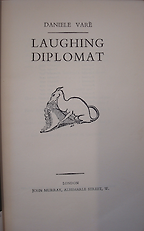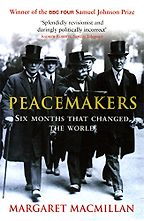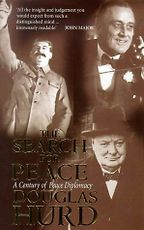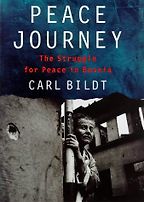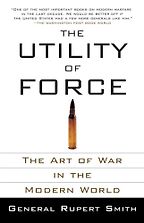Your first book?
It’s called The Laughing Diplomat by Daniele Varè, who was an Italian diplomat in the 1920s and 30s. I got it from my grandmother as a jeune diplomat, and it seemed to be a crummy second-hand bookshop number that should be off to Oxfam. But it was a fascinating book! Because what Varè captures is the excitement of representation, and the elegance of it as a profession in those days, from a time when diplomacy was glamorous. However, there’s more to it than that. First the title – diplomats don’t laugh, they smile. There’s a wonderful line in one of Douglas Hurd’s novels about the English as a people of thin smiles, and English diplomats have very thin smiles. So the idea of a laughing diplomat was rather a counterintuitive one. And this particular chap managed to have fun: he had a great appetite for the good things of diplomacy, had some pretty interesting times, and he wrote them up brilliantly.
Who was Varè?
He worked his way up through the ministry and was posted in China, Siberia, and around Europe – Vienna, Geneva – a lot of the old capitals. They gave him quite a good career, and along the way there are scenes of romance, intense political manoeuvring, and ‘grandeur and decadence’. But of course the sinister undertone is that he was increasingly representing a fascist dictatorship, and ultimately there had to be a disjuncture between the honourable way in which he represented his country – the very stylised nature of the exchanges he would take part in – and the thuggishness of the system he was there to represent.
Eventually it had to break, but the book as a result carries this wonderful feeling of, you know, the clichéd line about diplomats being ‘honest men sent abroad to lie for their country’ – he wasn’t lying, he was doing the best within the system to say what was true, but eventually the cord snapped. It’s a first person account both of the colour of being a diplomat, but then also making the point that what you’re representing is ultimately more important than how you represent it.
Can you forgive him for representing Fascism?
Yes – the early chapters are the ones one can most readily identify with: for his delight in the sheer beauty of the countries he represented Italy in, and the trips he did, the stimulating artistic and cultural figures he met. He had – before we get to the bedrock of representing a rotten regime – an understanding of what diplomacy is about. There’s a lovely line of his: ‘Diplomacy is not like football – instead of trying to win you also have to try and convince the other side that they won’. And that was something that drew me to diplomacy at the outset. Another way of putting it is: ‘The art of letting someone else have your way.’ There’s a modern dimension to his insights, in that diplomacy at its best is about giving the other side a way out, and, even when you’ve trounced them, giving them the feeling that they’ve actually done quite well out of this – not irrelevant to current political developments in the UK.
What is Peacemakers about?
This book was published in 2001 and written by Margaret Macmillan. This is the book that made her because she took a fresh look at the Versailles Treaty – about which we thought we already knew enough. Where The Laughing Diplomat was very much about the diplomatic lifestyle, here is the high policy: here are those compromises that have to be made between nations, which can be disastrous in their outcome or, in a more unexpected way, can actually do some good. And the beautiful story she tells is how men of goodwill did try to make the Second World War impossible. The Italians, the Chinese and the Japanese put in brief appearances, but it’s mainly about the clash of these three great men – Clemenceau, Lloyd George and Wilson, and the Germans playing their part as best they could. Individually, she takes you through their motivations, their style of operating, and their attempts to get things right.
Next book?
The Search for Peace by Douglas Hurd, who was UK Foreign Secretary for seven years from 1989, just after the fall of the Wall. He wrote it soon after stepping down. It’s a fine book, which for its day was quite comprehensive and authoritative. It’s a bit of a modern primer, which explains the techniques of bilateral diplomacy as well as multilateral diplomacy, and really deals with the failures and successes of the last century. The emotional heart of the book comes from his dedication to his own uncle, who was called Douglas Hurd, and died on the Somme. And the spirit informing the book is that, ultimately, the diplomats have to find ways of heading off those worst outcomes.
The other interesting aspect is that even after ten years it shows its age, because it was written at the high watermark of what people now describe as liberal interventionism – Blair’s and Clinton’s wars. He tells the story, over the best part of 100 years, of how non-intervention as such is not really a strategy. The two World Wars and the course that the Cold War took illustrated that – it’s very difficult to opt out of the great games. The 90s of course were the decade of Bosnia and the humiliation of Europe in former Yugoslavia. Within Europe, Hurd was a very fine foreign secretary, a successful negotiator, and he understood the European context. But what I see in this book is something a little quirky – Douglas Hurd perhaps stretching his own interventionist instincts. This was his liberal interventionist moment, where I think he was tending towards the view that yes there should have been more interventionism in Yugoslavia, and more effective interventionism. However, a few years later he rather returned to his more natural position: he was one of those who stood out very clearly against the American engagement in Iraq, and he turned out to be right.
Speaking of ex-Yugoslavia, can we discuss Carl Bildt’s book, Peace Journey?
Bildt is a former Swedish Prime Minister from the early 90s, who became European Representative in the Balkans after the war. He didn’t have an especially dynamic role, because in the summer of 1995 the Americans were increasingly committing themselves – partly because of the fall of Srebrenica, partly because they lost some very good men in the course of their own attempts to mediate – and it had become quite personal. So they engaged, in the formidable shape of Dick Holbrooke, and there was some sort of an outcome, which was the Dayton Agreement, after which Carl Bildt was rebaptised International High Representative, and I joined him as special advisor.
Despite my earlier diplomatic career, there wasn’t much to match what you go through in trying day after day to bring together people who have been slugging it out in the most awful war for three to four years. Bildt’s job was to try and create a political dispensation after Dayton that would bring the Croats, Serbs and what were called Bosniaks – Muslim Bosnians – into some sort of structure so that they could work together. It was a thankless job – and keeping the international coalition of support together was another very difficult thing, because he reported to the Americans, Russians, French, and British, who all had different views about how things should be handled.
What his book shows is this remorseless 20-hour-a-day routine of talking one moment to operational people within political parties causing difficulty to the implementation process on the ground, then getting a call from Warren Christopher, saying: ‘We fully support you, Carl, but we want to have a meeting with Milosevic in Italy so that we can be seen to be bolstering the Dayton Agreement one more time.’ It was precisely this diplomatic game played at this high level which undermined the prospects for Bildt achieving the credibility that would make the Bosnians play ball. So it’s a book which is quite a hard read: a restrained – you might say Nordic and moralistic – description of the weaknesses of the people there with whom he negotiated day by day. I think the book does project the many-sidedness of modern interventions. They are thought of as peacemaking, as seeking to entrench peace, as being about economic development, but there actually are so many dimensions: from the media, to how the courts operate, to policing, all of which you have here, in what is from my own knowledge a painfully honest and accurate depiction of what that assignment meant to Carl.
And The Utility of Force?
The last three books had ‘peace’ in the title – but war is actually the crucial component of the understanding of the role of diplomacy in the world. This is the one book I’ve chosen that is actually a visionary work. Rupert Smith was a professional soldier who became Deputy Supreme Allied Commander in NATO. Throughout his career he was the intellectual, and the military are sometimes a little intolerant of intellectuals, but the modern soldier has come to be a very thinking and imaginative player if he or she does the job well.
What Smith sees is that making war, or threatening war or the use of force, has increasingly had to encompass the disciplines usually understood in diplomacy, just as diplomacy itself has changed. Whereas at the time of Daniele Varè it was actually quite important which corner of your visiting card you turned down when you left it at the legation, a century on what we are looking at in difficult diplomatic situations has the layers I mentioned with the Dayton Agreement, of: Where are the media in this? How are we going to carry out civil implementation of a diplomatic agreement that ends a war? And Smith understands this terribly well.
One of his great purple passages is about how the wars of the future will not take place with hard power, or in terms of traditional military logistics, but will be about the soft power of people’s minds, and trying to get inside them. This book got a bit of a mixed reception, but very quickly it was read by staff officers and staff colleges and taken into the curriculum, and I think the really ground-breaking impact of his insights is now recognised all round.
How much is it about the direct application of force?
He has a wonderful military historical survey at the beginning, and he explains, through two World Wars, that what often made the difference were particular talents – what was taking place inside the minds of men. His greater originality is in seeing the importance of non-state actors. I think what he traces very well is that, after the almost phoney war of the Cold War, it made us think that things could be fixed for a generation or two. But the world we inhabit now – with questions of WMD, letter bombs and terrorism by the least likely suspects – that requires an understanding by diplomats of this interface of war in peacetime societies, and an expectation of soldiers to see beyond their immediate military brief.
Does he think we’re there yet?
When he wrote this in 2005, he was suggesting new directions. Good soldiers have caught up with where he was and in certain respects taken it further now. But good books show their age eloquently. And I bet he’s got a good next book in him.
July 9, 2010. Updated: May 23, 2023
Five Books aims to keep its book recommendations and interviews up to date. If you are the interviewee and would like to update your choice of books (or even just what you say about them) please email us at [email protected]
Five Books interviews are expensive to produce. If you've enjoyed this interview, please support us by donating a small amount.
